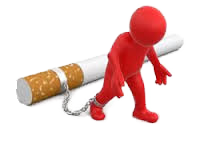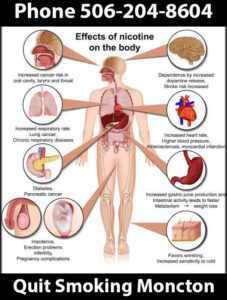Smokers and the Nicotine Trap
Any addicted smoker knows the feeling of being empty and insecure when you quit smoking. That is the Nicotine Trap, because as soon as you light up another cigarette those empty and insecure feelings go away. The Nicotine helps brainwash us into believing that smoking actually gives us pleasure.
As you can see from the list of body parts that Nicotine affects, nothing could be further from the truth.
The Five Big Myths About Smoking!
1 Smoking is a habit
2 Once a smoker, always a smoker
3 You have to suffer from withdrawal symptoms when you quit
4 The physical addiction to nicotine makes it difficult to stop
5 Nicotine is not harmful
Nicotine, a colourless, oily compound, is the drug contained in tobacco that addicts you to smoking. It’s the fastest addictive drug known to mankind, and just one cigarette can get you hooked.
Every puff on a cigarette delivers, via the lungs to the brain, a small dose of nicotine that acts more rapidly than the dose of heroin the addict injects into his veins. If there are twenty puffs for you in a cigarette, you receive twenty doses of the drug with just one cigarette.
Nicotine is a quick-acting drug, and levels in the bloodstream fall swiftly to about half within thirty minutes of smoking a cigarette and to a quarter within an hour. This explains why most smokers average about twenty per day.
Your brain is made up of billions of nerve cells. They communicate by releasing chemical messengers called neurotransmitters. Each neurotransmitter is like a key that fits into a special “lock,” called a receptor, located on the surface of nerve cells. When a neurotransmitter finds its receptor, it activates the receptor’s nerve cell.
The nicotine molecule is shaped like a neurotransmitter called acetylcholine. Acetylcholine and its receptors are involved in many functions, including muscle movement, breathing, heart rate, learning, and memory. They also cause the release of other neurotransmitters and hormones that affect your mood, appetite, memory, and more. When nicotine gets into the brain, it attaches to acetylcholine receptors and mimics the actions of acetylcholine.
Nicotine also activates areas of the brain that are involved in producing feelings of pleasure and reward. Recently, scientists discovered that nicotine raises the levels of a neurotransmitter called dopamine in the parts of the brain that produce feelings of pleasure and reward. Dopamine, which is sometimes called the pleasure molecule, is the same neurotransmitter that is involved in addictions to other drugs such as cocaine and heroin. Researchers now believe that this change in dopamine may play a key role in all addictions. This may help explain why it is so hard for people to stop smoking.
The best way to stop smoking is to never start in the first place!
Call Natalie today for a Free Consultation or to answer any Questions you may have
Stop Smoking in Moncton Today! Call 506-204-8604 to start Your New Life


